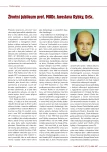Management of obesity – options, effectiveness and perspectives
Authors:
Š. Svačina
Authors‘ workplace:
III. interní klinika 1. lékařské fakulty UK a VFN Praha, přednosta prof. MUDr. Štěpán Svačina, DrSc., MBA
Published in:
Vnitř Lék 2011; 57(11): 946-948
Category:
Birthday
Overview
Weight reduction is an obvious aim of the obesity treatment. However, modern obesitology emphasises prevention of complications associated with obesity and improving the quality of life of obese patients. Consequently, obesity is a difficult to treat disease with respect to permanent weight reduction and easier to treat condition with respect to the quality of life. Life style changes usually fail as a treatment option, unless they are accompanied with personally demanding psychotherapy and motivational support. Compliance with the requirements for diabetes prevention is effective even without weight reduction. Treatment with anti-obesity medication and bariatric surgery are also associated with long-term effectiveness. However, orlistat is the only anti-obesity agent currently available. New anti-obesity medication with central effect that would replace no longer used sibutramin, are expected to reach clinical practice in a few years. The effect of incretin analogues on weight reduction also provides hope. Physical activity has the best effect on obese patients’ prognosis. Nonetheless, the future of obesity treatment is mainly associated with pharmacotherapy and new technologies, e.g. gastric stimulation.
Key words:
obesity – quality of life – diabetes prevention – anti-obesity agents – incretin analogues – bariatric surgery – gastric stimulation
Sources
1. Lajka J. Výsledky výzkumu obezity v ČR. Projekt VZOP Žij zdravě. STEM/MARK Praha 2011.
2. Svačina Š. Prevence diabetu a jeho komplikací. Praha: Triton 2008.
3. Smith SROV, Weissman NJ, Anderson CM et al. Behavioral Modification and Lorcaserin for Overweight and Obesity Management (BLOOM) Study Group. Multicenter, placebo-controlled trial of lorcaserin for weight management. N Engl J Med 2010; 363 : 245–256.
4. Svačina Š. Obezita diabetes. Praha: Maxdorf 2000.
5. Anderson JW. Orlistat for the management of overweight individuals and obesity: a review of potential for the 60-mg, over-the-counter dosage. Expert Opin Pharmacother 2007; 8 : 1733–1742.
6. Haluzík M, Svačina Š. Inkretinová léčba diabetu. Praha: Mladá Fronta 2010.
7. Fried M et al. Metabolická a chirurgická léčba obezity. Praha: Mladá Fronta 2011.
8. Svačina Š et al. Poruchy metabolismu a výživy. Praha: Galén 2010.
9. Unick JL, Beavers D, Jakicic JM et al. Look AHEAD Research Group. Effectiveness of Lifestyle Interventions for Individuals With Severe Obesity and Type 2 Diabetes: Results from the Look AHEAD trial. Diabetes Care 2011; 34 : 2152–2157.
10. Sanmiguel CP, Conklin JL, Cunneen SA et al. Gastric electrical stimulation with the TANTALUS System in obese type 2 diabetes patients: effect on weight and glycemic control. J Diabetes Sci Technol 2009; 3 : 64–970.
11. Paxman JR, Richardson JC, Dettmar PW et al. Daily ingestion of alginate reduces energy intake in free-living subjects. Appetite 2008; 51 : 713–719.
12. Philadelphia Business Journal. Startup Aspire inspired by its weight-loss device. Available at: http://www.bizjournals.com/philadelphia/print-edition/2011/03/25/startup-aspire-inspired-by-its.html.
13. Haluzík M, Svačina Š. Metabolický syndrom a nukleární receptory. Praha: Grada 2005.
14. Kirkham TC, Steven J. Appetite and Body Weight. Integrative Systems and the Development of Anti-Obesity Drugs. Amsterdam: Elsevier 2007.
Labels
Diabetology Endocrinology Internal medicineArticle was published in
Internal Medicine

2011 Issue 11
-
All articles in this issue
- Current and future options for treatment of osteoporosis
- Chronic pancreatitis in 2011
- Pathophysiological background for incretin therapy: is it capable of more than we think?
- How should we perceive psychosomatic medicine
- Adherence to the international guidelines on the treatment of diabetic leg syndrome – options available in the Czech Republic
- Antibiotic treatment of acute bacterial infections
- Incretins have changed and continue to change treatment strategy for type 2 diabetes
- Modern technologies in diabetology. CSII (Continuous Subcutaneous Insulin Infusion) and CGM (Continuous Glucose Monitoring) in clinical practice
- Is retardation of radiologic progression of ankylosing spondylitis possible?
- Insulin therapy in 2011
- Genetics of monogenic forms of diabetes
- Management of obesity – options, effectiveness and perspectives
- Pathogenesis of type 1 and type 2 diabetes in 2011 – the unifying model of glucoregulation disorder
- An outlook to the future of pharmacotherapy for type 2 diabetes mellitus
- Pharmacotherapy of chronic heart failure after the first decade of 21st century
- Pharmacotherapy following myocardial infarction
- Advances in metabolism and nutrition 2011 and the route to personalized treatment
- Internal Medicine
- Journal archive
- Current issue
- Online only
- About the journal
Most read in this issue
- Antibiotic treatment of acute bacterial infections
- Modern technologies in diabetology. CSII (Continuous Subcutaneous Insulin Infusion) and CGM (Continuous Glucose Monitoring) in clinical practice
- Management of obesity – options, effectiveness and perspectives
- Genetics of monogenic forms of diabetes
